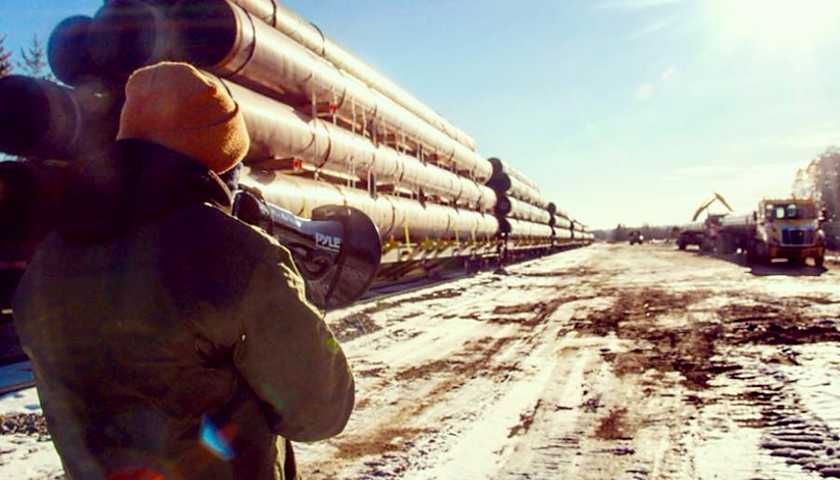The Minnesota Court of Appeals on Monday overturned a portion of the environmental impact study of Enbridge Energy’s Line 3 oil pipeline replacement project.
The court’s ruling is available here.
The ruling says:
Although we reject most of realtors’ assertions of error, we agree that the FEIS is inadequate because it does not address the potential impact of an oil spill into the Lake Superior watershed. Accordingly, we reverse the commission’s adequacy determination and remand for further proceedings consistent with this decision.
FEIS refers to the final Environmental Impact Statement.
Enbridge in April 2015 applied for a certificate of need and routing permit to install of 337 miles of pipe and facilities from the North Dakota-Minnesota border to the Minnesota-Wisconsin border to replace the already existing Line 3, part of Enbridge’s Mainline System, the court said.
Environmental organizations and tribal bands had challenged a decision made last year by the Minnesota Public Utilities Commission (PUC) which found the FEIS was adequate, the court said.
However, the court also upheld most of the environmental impact statement and dismissed most of the opponents’ arguments, Minnesota Public Radio said. The rejected arguments included claims that the study didn’t take into account the pipeline’s climate impacts and there had not been an adequate analysis of the impacts to tribal cultural resources.
The opponents involved in the case told Minnesota Public Radio they may appeal the decision to the Minnesota Supreme Court. The environmental impact statement is expected to be returned to the PUC, which would decide what to do next for the pipeline.
The court’s ruling throws into question the PUC’s approval last year of a certificate of need and route for the pipeline, because the findings of the now-rejected environmental impact statement factored significantly into both.
Environmental group Stop Line 3 posted a Facebook Live video Monday featuring “water protectors,” some of whom locked themselves to machinery. The narrator says Enbridge was clearing land and wetlands at a site near Park Rapids, Minnesota, to build electric lines for pump stations.
One protester, going by the name of Francis, said she was in solidarity with the indigenous people and “the land herself.”
“We want to live to be old in this world, Francis said.
The organization’s Facebook page posted Monday that Francis and two others who had locked themselves to the machines had been arrested and linked to a GoFundMe page to pay their bail.
In February, four protesters were arrested for allegedly disabling an Enbridge pipeline, Battleground State News reported.
But some in Minnesota support the pipeline replacement.
One pro-pipeline group, Minnesotans4L3, sounded upbeat about the court ruling in its reaction posted on Twitter.
The group posted three tweets giving their position. The first tweet said:
Statement about the @MNCourts decision today about the #line3 EIS (1 of 3) “The court today rejected almost all of of claims made by opponents and confirmed that the vast majority of the information that is part of the Line 3 EIS is complete and supports permit applications”
Statement about the @MNCourts decision today about the #line3 EIS (1 of 3) "The court today rejected almost all of of claims made by opponents and confirmed that the vast majority of the information that is part of the Line 3 EIS is complete and supports permit applications"
— Minnesotans4L3 (@minnesotans4L3) June 3, 2019
Minnesotans4L3 concluded by saying the ruling should not stop permit applications.
State Senate Majority Leader Paul Gazelka (R-MN-09) tweeted, “Yet another needless delay to the important Line 3 pipeline. Let’s not forget the reason for the project – to replace the aging, dangerous existing pipeline.”
Yet another needless delay to the important Line 3 pipeline. Let’s not forget the reason for the project – to replace the aging, dangerous existing pipeline.
— Paul Gazelka (@paulgazelka) June 3, 2019
Those supporting the pipeline replacement have frequently cited safety as a reason.
In February, Republican members of the Minnesota Legislature criticized Gov. Tim Walz (D-MN) for re-appealing the pipeline replacement project, Battleground State News reported. An appeal submitted by his predecessor, former Gov. Mark Dayton (D-MN), was dismissed by the Minnesota Court of Appeals.
Gazelka said it would be safer to replace the 51-year-old pipe.
“Lawsuits and appeals do not have to be part of the process, and normally shouldn’t be part of the process,” Gazelka said.
– – –
Jason M. Reynolds has more than 20 years’ experience as a journalist at outlets of all sizes.
Photo “Pipeline Protester” by Stop Line 3.





